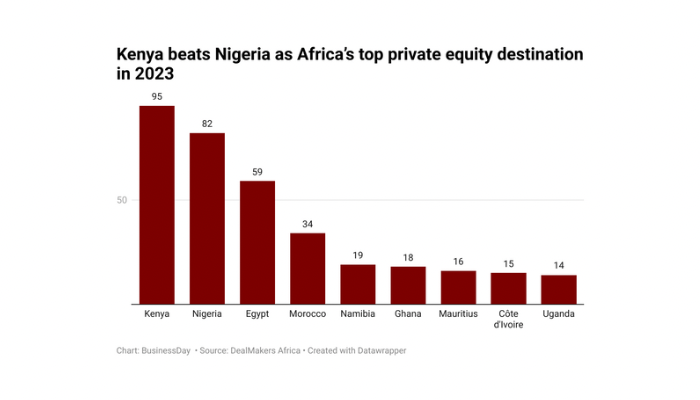Kenya has overtaken Nigeria as the country that got the highest private equity deals in Africa last year, according to a new report by DealMakers Africa.
The report by the South African-based firm which tracks Mergers and acquisitions (M&A) and corporate finance activity across the continent shows that Kenya and Nigeria which are the powerhouses of their regions recorded the most local deals with 95 ($600.3 million) and 82 ($493.1 million) respectively.
Further analysis revealed that both countries recorded a year-on-year decline in private equity deals. In 2022, Africa’s biggest economy attracted 135 deals while Kenya had 123 deals.
“Private equity investment, which for some years now has provided the momentum for M&A activity growth on the continent, was subdued in 2023. This is not surprising, given the higher interest rates and the fact that private equity firms rely on borrowing to part-fund deals,” the report said.
The nalysis shows that, as a percentage of the total deal value, private equity transactions continue to increase and have, for the past few years, constituted 50 percent of the deal flow.
“The value of deal activity recorded was $11.2 billion, a 36 percent decline on the previous year, and 28 percent down on the pre-COVID numbers of 2019. East Africa edged its way back to the top to claim the most activity per region, recording 144 deals, followed by West Africa (136 deals) and North Africa (107 deals),” the report added.
In terms of deal value, Southern Africa which stood out, and more specifically, Zimbabwe, with total deals valued at $5.8 billion, reflecting the size of several mining transactions announced during the year.
While recessionary fears haven’t vanished, they have lessened, supported by the recent forecast by the African Development Bank in its latest Macroeconomic Performance Outlook, which projects that Africa’s GDP will grow 3.8 percent in 2024, and 4.2 percent in 2025, according to authors of the report.
“This feeds into the narrative that consumption will be the driver of investor activity on the continent, with sectors most likely to attract sizeable M&A activity being energy and natural resources, telecommunications and technology, consumer goods and retail, and infrastructure development,” they said.
They added that of the top 10 deals by value for 2023, eight involved targets in the energy or resources sectors, and these were predominantly located in Southern Africa. By Bunmi Bailey, Business Day






